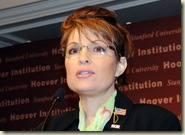 The Presidential campaign is, after 127 years, winding down and the candidates are essentially making their final pitches - generally dialing back the attacks and amping up the positive messages - city on the hill, the future is bright, that kind of thing.
The Presidential campaign is, after 127 years, winding down and the candidates are essentially making their final pitches - generally dialing back the attacks and amping up the positive messages - city on the hill, the future is bright, that kind of thing.
So it's interesting to see that Sarah Palin gave a full speech on energy issues today. This has proven to be one of the brightest lights of the McCain/Palin campaign because it responds in a focused way to an issue of concern. That light has dimmed a bit due to the drop in oil prices and a bit more due to the stock market tsunami, so it strikes us as a good topic on which to wind things down. Even if the short-term concern has drooped away a bit, it's still a concern and worth a hearing.
The speech can be found on the campaign Web site here. Here's the take-away on nuclear energy:
Another essential means to energy independence is a dramatic expansion in our use of nuclear energy. In a McCain administration, we will set this nation on a course to build 45 new reactors by the year 2030. And we will set the goal of 100 new plants to power the homes and factories and cities of America.
This task will be as difficult as it is necessary. We will need to recover all the knowledge and skills that have been lost over three stagnant decades in a highly technical field. We will need to solve complex problems of moving and storing materials that will always need safeguarding. We will need to do all of these things, and do them right, as we have done great things before.
The line about safeguarding materials seems awfully close to Obama's concerns about safety and not McCain's repeated assurance that Yucca Mountain is the way to go - we've noticed Governor Palin has been marking out some territory as her own and this might fall into that category - but she has the balance between growing the infrastructure and the workforce about right. These things are happening anyway, but it's good to know Palin wants to encourage it further.
---
So, we're less than a week from the election, Obama's big pitch comes tonight, the campaigns are trying to flip a few stubborn states (Gov. Plain delivered her speech in Toledo - the next election should have an Ohioan on a ticket just so we can deny the state its favored status - hrmff!), and our hair is a little - grayer - and thinner.
Search for any of the four candidates in the handy box above if you'd like to get caught up on NNN's coverage of the debates, speeches, and conventions - and then do the same amongst the sites you visit for the other topics that interest you.
Can't speak for anyone but me, of course, but this feels like the most consequential presidential election of my wastrel life - I first voted during the Carter/Reagan match-up, so there's been some big ones - and although nuclear energy figures heavily in my thinking, many other issues do, too. And the candidates, darn them, have made this one tough decision.
Tough, but not impossible. So be sure to vote this year. Vote luminously - vote radiantly - but vote.
Governor Palin.
Comments
Though an inspiring infomercial in most respects, Obama managed to leave nuclear completely off of his list of responses to our twin energy challenges - supply security and emissions control.
Perhaps I am wrong to be concerned. Perhaps Obama has been convinced through his study of the issue that the easy thing to do is to redefine the word "renewable" to include all non-carbon sources that can operate for the foreseeable future of human society.
By that definition, fission would become another (the best IMHO) choice in the renewable menu and thus an integral part of the energy infrastructure.
Go Sarah Go!
OK, now let's hear the ridicule.
No, you are right to be concerned.
Before McCain, the most pro-nuclear presidential candidate was Paul Tsongas (a Democrat from Massachusetts, no less). Another presidential hopeful, William Clinton, used that support of nuclear as a weapon to bludgeon him during the early part of the 1992 campaign.
As we all know, the Clinton/Gore administration was no friend of nuclear power. They even zeroed out the DOE's R&D budget for nuclear technology in 1998.
Obama's rhetoric is hardly reassuring, but it is not as bad as President Clinton's.
http://www.dailykos.com/story/2005/4/10/182655/427
In the U.S., the actual centralized planning we see involves renewable portfolio standards. I'd prefer to have the market pick the winner, and not rely upon luck that the central planner was correct....
France was run ny a bunch of no-nonsense elite engineers.
Not by a bunch of freaking lawyers and MBA's without any understanding of the physical reality, as a certain other nation I can mention is.
/Starvid